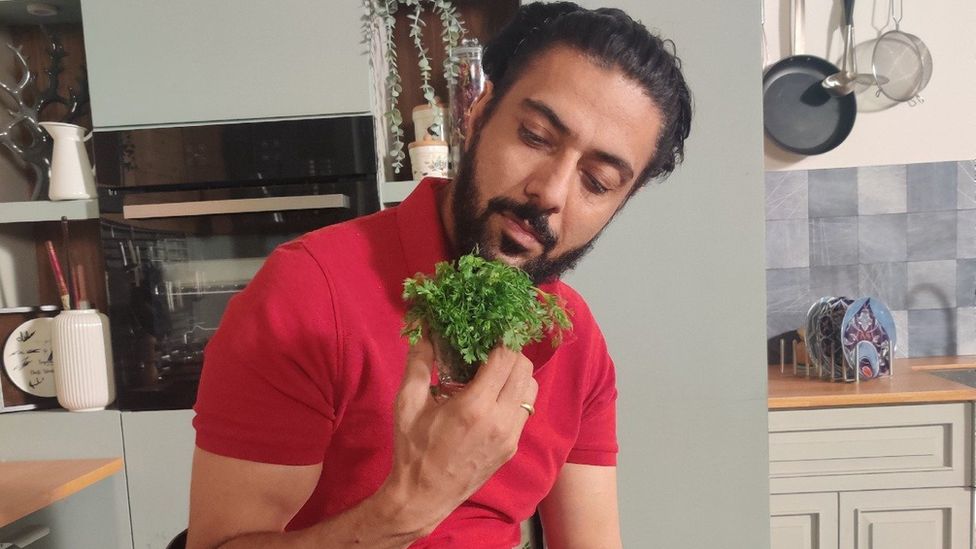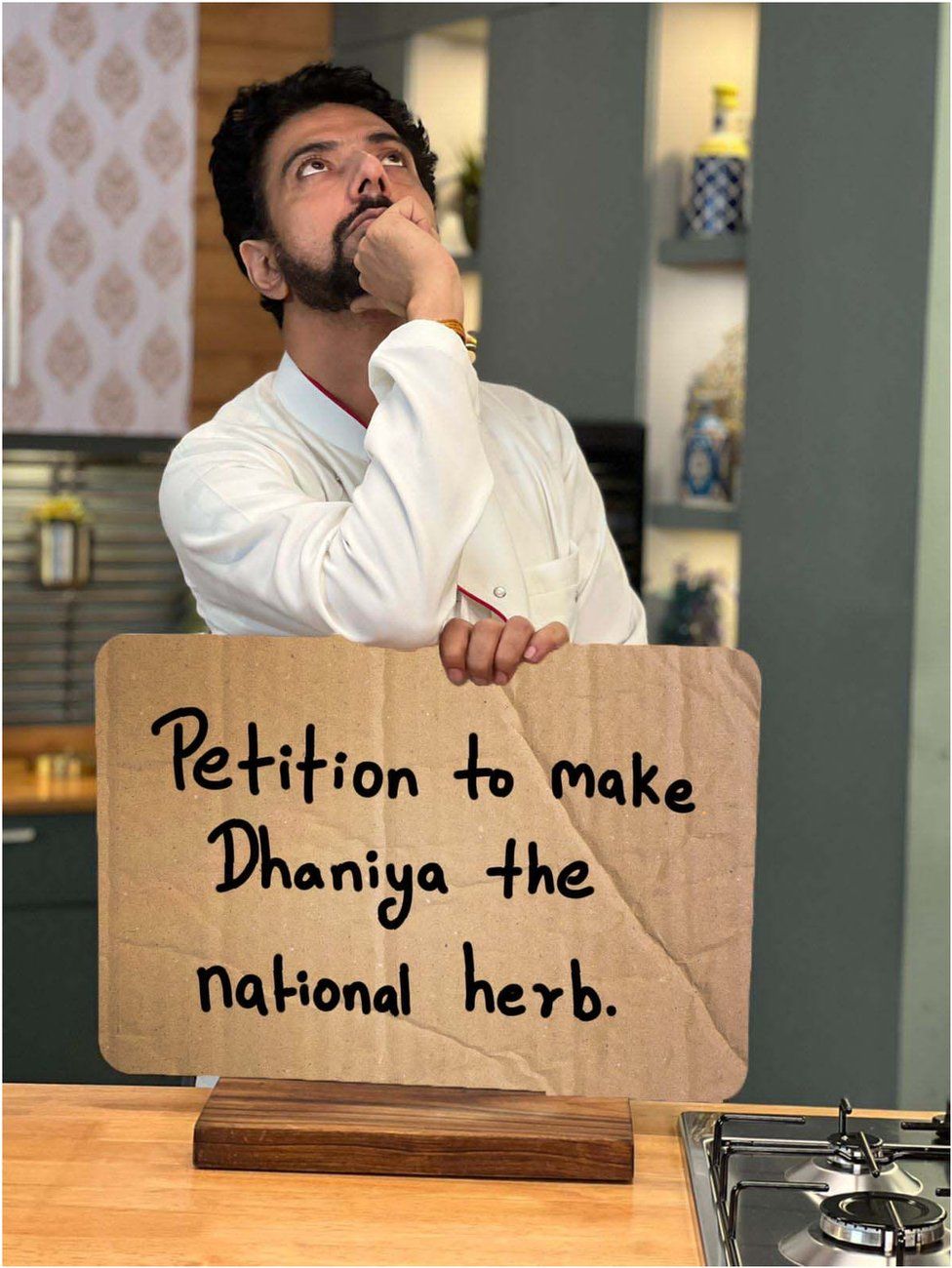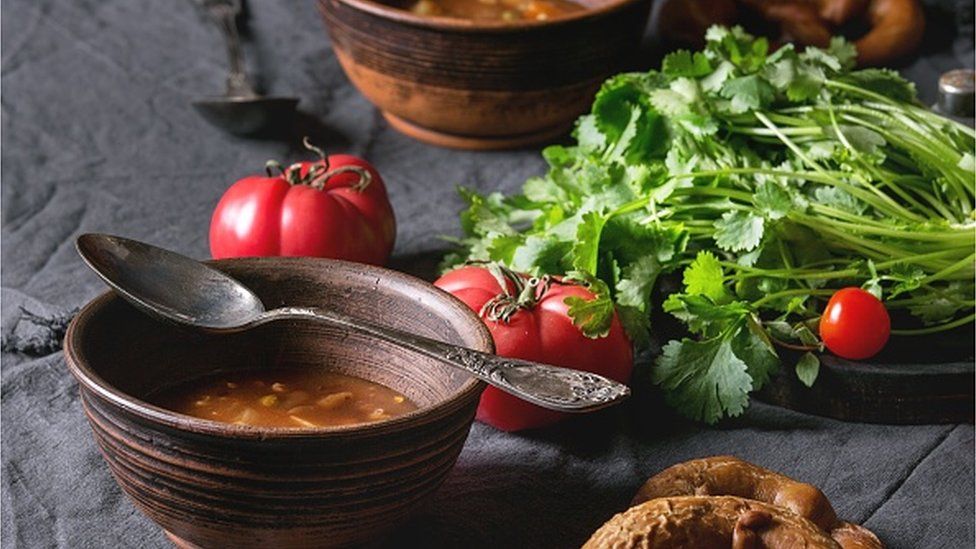Ranveer Brar: The chef who wants coriander as India's national herb
 Image source, Ranveer Brar
Image source, Ranveer BrarLike millions of Indians, if there's one herb that I cannot live without, it's coriander.
I use it to garnish dals, vegetables and my favourite chutney sauce is made simply by blending the herb with tomatoes, green chillies, garlic and salt.
And now one of India's most popular chefs has started a petition to get the humble leaves designated "India's national herb".
Chef Ranveer Brar says coriander - called dhaniya or kothmir in India, and cilantro in the US - is "the superstar of our kitchen".
"No Indian dish is complete without coriander. No other herb even comes close to it in versatility," he told me on the phone from his home in Mumbai.
The chef, who runs two restaurants in Boston, is a celebrity in India with 1.7 million followers each on Instagram and Twitter and 3.3 million followers on Facebook. His YouTube channel has nearly five million subscribers.
"Coriander," he says, "is a herb that you either love or hate - majority, of course, love it. It has peppery and floral notes that make it so unique. It's a very interesting and complicated bouquet of notes such as lime zest, pepper and celery."
Chef Brar, who uses coriander "a lot in his cooking at home too", says its flavours can be very different depending on when it's used in the cooking - for instance, whether it's sauteed in the pan at the beginning or added at the end.
But what makes it truly special, he adds, is that it's a "root-to-fruit" plant.
"Every part of it is used in our cooking. The leaves are used for garnishing curries and dals, they are added to breads and meat dishes, its stems and roots are used in soups and stews and its fruit or seeds are used as a popular spice."
Chef Brar first suggested "giving the humble dhaniya its due" a few months back when he playfully put up a post on Instagram, saying let's start a petition to designate it as the national herb.
"In my own way, I wanted to put out my idea for a national herb," he says.
 Image source, Ranveer Brar
Image source, Ranveer Brar
The post created "a lot of interesting conversations", with many asking where they could sign it, so he started a petition on change.org on Thursday.
"If you have cooked something today, the chances are that you have reached out for coriander, chopped and tossed it into your dish or used its bright green leaves as garnish," he wrote.
"This herb is packed with flavours. It can spice up any dish you are making. From Kashmir to Kanyakumari, every Indian loves coriander in almost all dishes," he added.
Addressed to the ministry of food processing industries, the petition has already gathered more than 5,500 signatures.
"Food without dhaniya is like a princess without her tiara," wrote one signatory. "It's because every food is incomplete without dhaniya," wrote another. Many expressed support on his social media posts with one woman on Instagram writing that she "panics" when her store depletes.
According to the Encyclopaedia of Food Sciences and Nutrition, coriander was known as far back as 5000BC and is mentioned in the Bible. It was used by the Romans and Greeks to treat disorders of the digestive, respiratory and urinary systems, and the Chinese, Indians and Europeans have all cultivated it for thousands of years.
Today, it's grown and used extensively across Europe, the Mediterranean, north Africa, the Americas, China and Bangladesh.
Dr Bhopal Singh Tomar, a crop scientist and head of the vegetable science division at Indian Agricultural Research Institute, says coriander is grown across the country and round the year.
 Image source, Getty Images
Image source, Getty Images"Forty years ago, it was a seasonal crop in India and was available only in the winters and was sold mostly in the cities," he told me. "But today, coriander is grown through the year from imported seeds, and millions of Indians grow it in their own kitchen gardens."
Besides its use for taste and flavouring, another reason behind the growing popularity of the herb is the major health benefits it offers.
Years ago, while on assignment in a Delhi slum, I heard a gynaecologist advising pregnant women from the poorest families to include "cheaply available dhaniya" in their daily diet for its high iron content, essential for the healthy growth of the foetus.
Research also shows that the plant seeds have anti-inflammatory properties and could help those suffering with arthritis.
Chef Brar too describes coriander as "a superfood" in his petition, especially emphasising that it "helps control diabetes and decreases cholesterol".
In India, which is home to 80 million diabetics and where over 17 million die from cardiovascular diseases every year, "a herb which makes every delicacy flavourful and sparks joy in our hearts must get the glory it truly deserves", he writes.



No comments